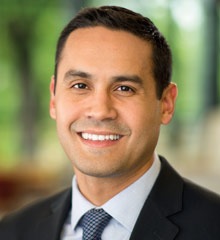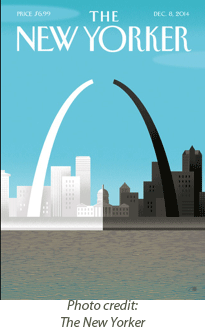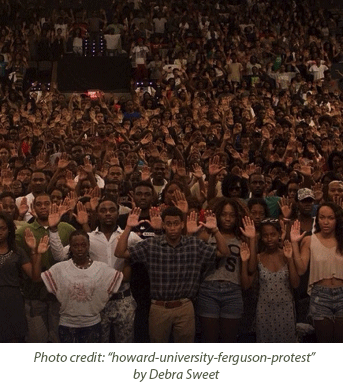
Teaching #Ferguson
Ferguson is revelatory.
“I wanted to comment on the tragic rift that we’re witnessing,” Bob Staake says about his cover for the December 8th issue of The New Yorker, arriving next week. “I lived in St. Louis for seventeen years before moving to Massachusetts, so watching the news right now breaks my heart. At first glance, one might see a representation of the Gateway Arch as split and divided, but my hope is that the events in Ferguson will provide a bridge and an opportunity for the city, and also for the country, to learn and come together.
Studies demonstrate how incredibly divisive reactions to Ferguson are, especially along racial lines. And if your Facebook feed is as diverse as mine, you have seen the full spectrum of reactions and  emotions. Empathy and confusion, relief and regret, compassion and indifference all sit uneasily next to each other.
emotions. Empathy and confusion, relief and regret, compassion and indifference all sit uneasily next to each other.
As a theological educator, these are pressing matters in my classroom. After all, how can I help my students think about Scripture in the midst of so much division, in the midst of so much hopelessness, in the midst of protest, in the midst of so little understanding across lines of difference? How do we speak and act faithfully in moments so pregnant with meaning?
Fortunately, the resources available to us as teachers to think about Ferguson are manifold. Pride of place belongs to another blog hosted by the Wabash Center, Race Matters in the Classroom.
My own reflections on teaching #Ferguson are shaped by the new class I’m teaching at the moment. My colleague and I have two semesters to introduce Scripture, its theological import, and the wide diversity of those who have read and loved and (sometimes) misused these texts for generations.
In the class, I teach Scripture in all its complexities. These texts evade easy answers and bear the most significant questions we can conjure. These texts narrate moments of liberation alongside tragedies. These texts have inspired the marginalized to speak prophetically, but these texts have also been aligned with the cruelest forms of dehumanization. That is, these texts contain stories of hope and stories of despair. These texts have fueled liberation and oppression. How then do we learn from the insights and mistakes of the past and present? How do we help communities extend the stories of God’s moving in the midst of those people who seek to follow God?
And so I hope to teach my students that the application of Scripture to these contemporary matters  is neither mechanical nor simple. But what is equally true is that these living words of God can breathe life into communities stifled by oppression. Scripture is a powerful source of imagination, an imagination for a world turned upside down.
is neither mechanical nor simple. But what is equally true is that these living words of God can breathe life into communities stifled by oppression. Scripture is a powerful source of imagination, an imagination for a world turned upside down.
I can’t avoid thinking and teaching about Ferguson and its aftermath. If our theology cannot speak in Ferguson, then I can’t help but wonder if our theology is worthy of its name and even more importantly worthy of the God we yearn to follow. And if we teachers don’t equip our students to speak in places like Ferguson and if we don’t invite them to do so even now, then our pedagogies will leave us poorer as a people and a church.
In short then, Ferguson is revelatory. It betrays pedagogies that are not up to the task and belies theologies merely posing as God’s living word. Are we up to the task? Can we teach in such moments? We can, and we must.